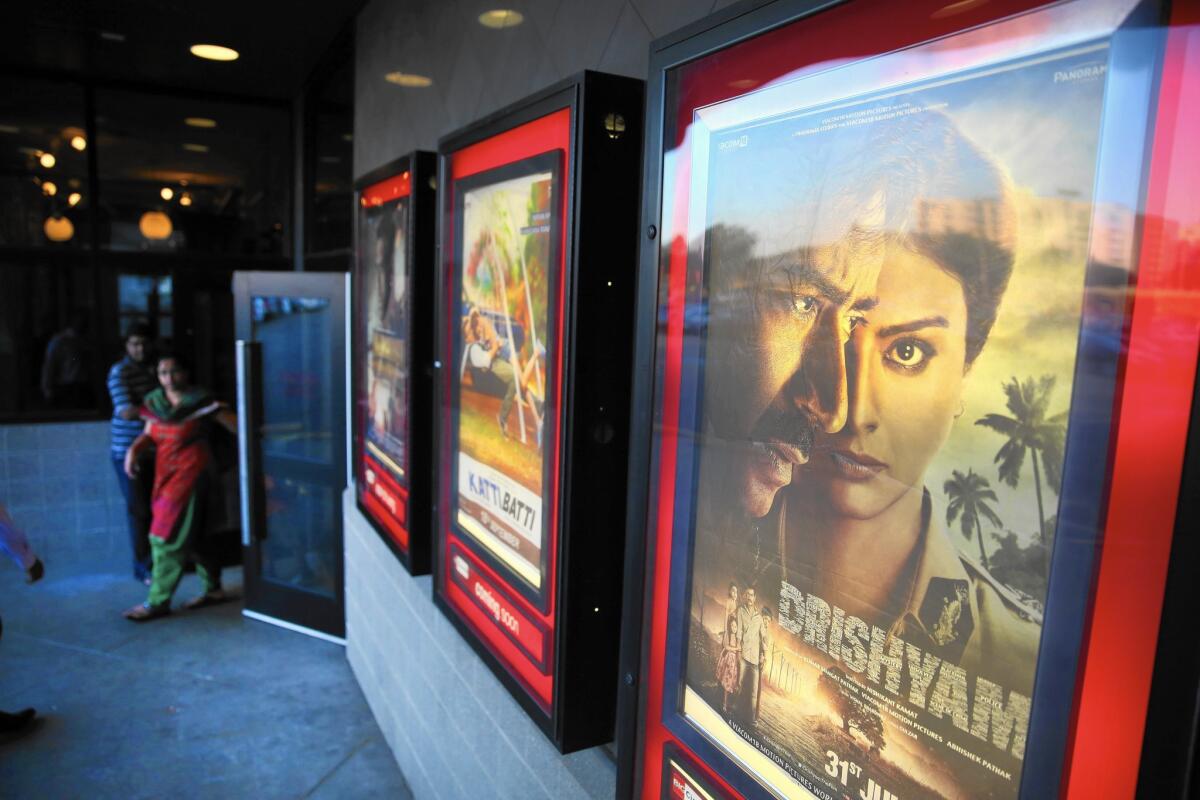Two hot-ticket movies show Indian film industry is moving beyond Bollywood

Harish Kumar considered himself lucky to nab a ticket on a recent night at Cinemark’s sprawling theater complex at the Howard Hughes Center in Westchester.
The 20-year-old student wasn’t sure he’d get a seat for a movie that has had sold-out crowds since its debut. But it wasn’t a big blockbuster such as “Mission: Impossible,” “Minions” or “Jurassic World” that Kumar went to see.
The hot ticket was for the epic action fantasy flick “Baahubali,” an Indian export that has the rare distinction of being a foreign film that’s broken into the top 10 at the U.S. box office. What’s more surprising, it was the second Indian film to claim the same bragging rights this summer.
SIGN UP for the free Indie Focus movies newsletter >>
“Baahubali” and the tear-jerker “Bajrangi Bhaijaan” have grossed a combined $15 million since opening in late July. This is the first time two Indian-produced films have cracked the box office charts in the same year, and analysts say it demonstrates an expatriate audience flexing its muscle at the cineplex.
“It is staggering that ‘Baahubali’ opened in just 170 locations in the U.S. and made over $3 million in a weekend,” Rentrak analyst Paul Dergarabedian said. “It was competing with movies that were in two to four thousand locations and yet made it to the top 10 in a sea of summer movies.”
-----------
FOR THE RECORD
Aug. 15, 10:48 a.m.: An earlier version of this article misspelled Rentrak as Rentrack.
-----------
The success of the films mirrors the surge of the Indian American population in the U.S. The U.S. Census Bureau reports that the number of people of Indian ethnicity grew by nearly 70% between 2000 and 2010 to more than 2.8 million.
California alone has more than half a million Indian Americans, with the Greater Los Angeles area home to nearly 120,000.
The success of “Bajrangi” and “Baahubali” also shows how the Indian film industry has evolved beyond the song-and-dance-packed Bollywood, its most visible and prominent export.
Bollywood is the commercial Hindi-language cinema that dominates Indian movies. India, however, has more than 20 widespread regional languages, each with its own film industry. Movies made in Telugu and Tamil, two regional languages, have wide appeal all over India. “Baahubali” was made in both Telugu and Tamil.
“Baahubali” was the ninth-highest-grossing film in the U.S. when it opened on July 9. The movie stars Prabhas and Rana Daggubati, with acclaimed filmmaker S.S. Rajamouli as the director.
The film has received praise for its inventive action sequences and computer graphics, both of which were mounted on a scale previously unseen in Indian cinema. It’s recently jumped to No. 3 on the list of highest-grossing Indian movies ever.
“Bajrangi Bhaijaan,” a sentimental drama, also was the ninth-highest-grossing film when it opened July 17. It follows the story of a Pakistani girl who gets lost in India before finding her way back home, and is the fifth-highest-grossing Indian movie ever made. On its opening in the U.S., it even outgrossed “Mr. Holmes,” the Sherlock Holmes drama starring Sir Ian McKellen.
The first full-length Indian movie was made in 1913, and since then the country’s cinema has spawned a following not just in South Asian and Middle Eastern countries but also in the former Soviet Union, Western Europe and the U.S. India has become the world’s fifth-largest film market, with revenue of around $1.5 billion a year, according to the Motion Picture Assn. of America.
Ticket prices are very low by American standards, yet blockbuster Indian movies make between $50 million to a $100 million in gross revenue. The 2014 hit “PK,” for example, was made on a budget of about $13 million and grossed more than $110 million worldwide.
These days, commercial Bollywood flicks coexist with more critically acclaimed films. Three Indian movies have been nominated for foreign language film since the first Oscar nod for “Mother India” in 1958. The Academy Award-winning film “Slumdog Millionaire,” a British production set in India, borrowed both Indian actors and a Bollywood ethos.
Yet it is the big summer blockbusters, much like in Hollywood, that draw the crowds.
“Five years ago, the biggest Bollywood film would open in about 120 theaters. Today, the top ones often open in over 250 locations as more theaters in more parts of the country have been getting in on the action,” said Gitesh Pandya, head of box office analysis site Box Office Guru.
That’s still a small number compared with the thousands of theaters that Hollywood films play in. There are less than a dozen theaters in the U.S. that play Indian films exclusively, according to Pandya. They’re in places with affluent Indian communities such as San Jose, the Chicago suburb of Niles, Ill., and Falls Church, Va.
Many Indian films also play in big-chain multiplexes such as AMC, Regal and Cinemark. New York, New Jersey and the Bay Area see the top grosses for Indian movies nationwide, and Chicago, Houston, Dallas and almost all of the top 20 markets in the U.S. have solid ticket sales for Indian films.
“Demand for Indian movies is going up all the time,” said Raman Sanchula, owner of Towne 3 Cinemas in San Jose and Moviemax Cinemas in Chicago. Both theaters play predominantly Indian films. “Also, every year more and more Indianstudents come to U.S. universities. They are a big part of our audience.”
Those fans also bring Indian ways of celebrating. They throw confetti at the screen when their favorite actor appears. “In India, people throw money,” Sanchula says.
For many expatriates, Indian movies also offer a connection with the homeland. Some 87.2% of Indian Americans in 2010 were foreign-born, according to the Pew Research Center. This is the highest of any Asian population in the U.S.
However, the chances of these films having wide cross-over appeal to non-Indians appear slim.
“Indian films often mix different genres into the same movie,” said film critic Danny Bowes, who wrote about Bollywood for Rogerebert.com. “So one minute you’re watching a heist movie, the next a romantic comedy. And then the actors break into song.” This kind of style might be intimidating for non-Indians, he said.
For Indian audiences, that format is a familiar and essential part of their passion for the movies.
At the recent screening of “Baahubali,” the audience gave a standing ovation when the movie was over. Kumar said he was excited to see the performance of Indian actor Prabhas, who goes by one name and is one of India’s biggest male leads.
“I was a huge fan of Prabhas before I came to America,” Kumar said. “I’m so glad I get to watch him on the big screen in Los Angeles.”
MORE:
‘Brothers’ remake of ‘Warriors’ offers a beefier version aimed at India market
Vidhu Vinod Chopra’s ‘Broken Horses’ treks from Bollywood to Hollywood
‘Court’ renders judgment on modern vs. traditional in India
More to Read
From the Oscars to the Emmys.
Get the Envelope newsletter for exclusive awards season coverage, behind-the-scenes stories from the Envelope podcast and columnist Glenn Whipp’s must-read analysis.
You may occasionally receive promotional content from the Los Angeles Times.






